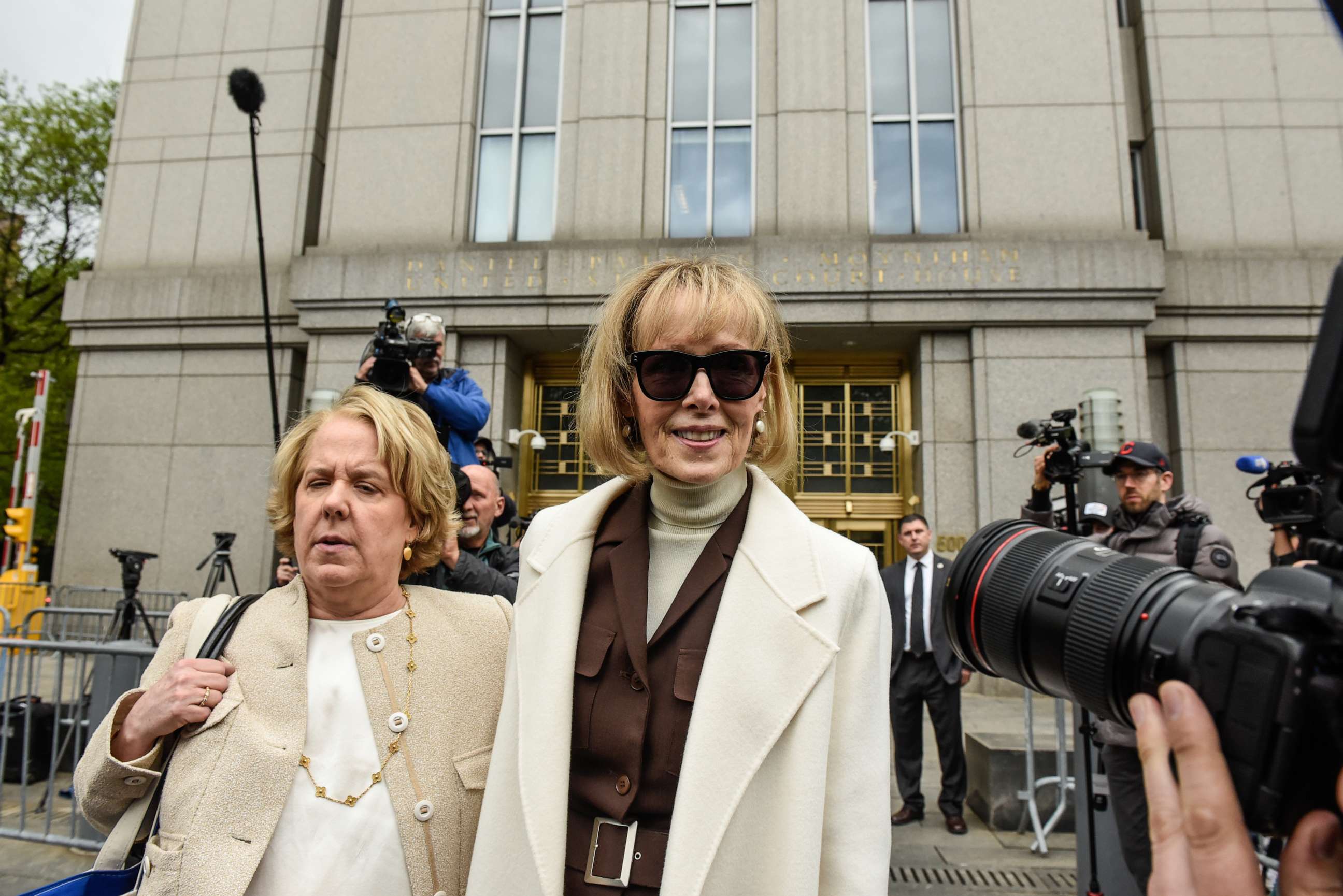Repairing Trump's alleged damage to E. Jean Carroll's reputation could cost up to $2.7 million, expert testifies
The writer alleges that Trump defamed her when he denied her rape claim.
Repairing the damage to writer E. Jean Carroll's reputation caused by then-President Donald Trump's Oct. 12, 2022, social media post that allegedly defamed her could cost up to $2.7 million, a marketing expert told the jury Thursday on the last day of testimony in Carroll's defamation and battery case against the former president.
Carroll, who brought the lawsuit in November, alleges that Trump defamed her in his Truth Social post by calling her allegations "a Hoax and a lie" and saying "This woman is not my type!" when he denied her claim that Trump raped her in a Bergdorf Goodman dressing room in the 1990s.
The former Elle magazine columnist added a charge of battery under a recently adopted New York law that allows adult survivors of sexual abuse to sue their alleged attacker regardless of the statute of limitations. Trump has denied all allegations that he raped Carroll or defamed her.
Northwestern University professor Ashlee Humphreys testified Thursday that Trump's post, in which he called Carroll's claim a "con job," was viewed between 13 and 18 million times, and she estimated that about 5 million users believed its content.
Humphreys told the jury that although Trump posted his statement solely on his Truth Social platform, "it appeared widely" throughout the mass media.
Repairing Carroll's reputation through a publicity campaign would cost between $368,000 and $2.7 million, Humphreys testified.
The testimony is the first that speaks to a potential damage award if the jury finds Trump liable for defamation or battery. The nine-member jury of six men and three women is weighing Carroll's defamation and battery claims and deciding potential monetary damages.

On cross-examination, Humphreys agreed that Trump's views of Carroll's rape allegation were well-known by the time he made the post in October 2022.
"The horse was kind of out of the barn," defense attorney Perry Brandt said.
Earlier in the day, the jury viewed clips from Trump's videotaped deposition, including the moment when he was shown a photograph of Carroll from the 1980s and said, "That's Marla," momentarily confusing his rape accuser for his second wife, Marla Maples.
Carroll's attorneys argued that belies Trump's assertion that Carroll is not his type.
Asked during the deposition about the so-called "Access Hollywood" video in which Trump is heard bragging about how he grabs and kisses women without consent, Trump was seen dismissing the remarks as "locker room talk."
Trump was also seen on the deposition video calling Carroll a "nut job."
The final witness was Roberta Myers, the former editor-in-chief of Elle magazine, who called Carroll a "truth teller" and spoke to the popularity of her advice column.
"They loved her. The readers loved her," Myers said.
Carroll lost her column after going public with her rape claim against Trump in 2019, and testified earlier about what that cost her both financially and emotionally.
A day after defense attorney Joe Tacopina told Judge Lewis Kaplan that Trump would not be mounting a defense, the judge asked Tacopina, once both sides had rested their case Thursday, to reaffirm that.
"Mr. Trump waives his right to testify in this case, is that right?" Kaplan asked. "Yes sir," Tacopina answered.
Asked how recently Tacopina had spoken to Trump about it, Tacopina said it was a few minutes before he arrived in court.
The judge allowed Trump one more chance to reconsider, giving Tacopina until 5 p.m. Sunday to file a motion to reopen the case for the sole purpose of Trump's testifying.
"He has a right to testify, which has been waived -- but if he has second thoughts, I will at least consider it," the judge said.
If there is no such motion by 5 p.m. Sunday, Kaplan said, "that ship has irrevocably sailed."
Each side is expected to deliver closing statements Monday. The judge is then expected to charge the jury on Tuesday, followed by the start of deliberations.
Jurors will first be asked to decide whether Carroll proved that Trump committed a battery. If so, the jury would be asked to decide what kind -- forcible touching, sex abuse or rape -- and then consider compensatory and punitive damages.
The jury would then move to Carroll's defamation claim and decide whether Trump's October 2022 social media post about Carroll was made with actual malice.
Carroll's lawsuit is her second against Trump related to her rape allegation.
She previously sued Trump in 2019 after the then-president denied her rape claim by telling The Hill that Carroll was "totally lying," saying, "I'll say it with great respect: No. 1, she's not my type. No. 2, it never happened. It never happened, OK?" That defamation suit has been caught in a procedural back-and-forth over the question of whether Trump, as president, was acting in his official capacity as an employee of the federal government when he made those remarks.
If Trump is determined to have been acting as a government employee, the U.S. government would substitute as the defendant in that suit -- which means that case would go away, since the government cannot be sued for defamation.
This month's trial is taking place as Trump seeks the White House for a third time, while facing numerous legal challenges related to the Jan. 6 Capitol attack, his handling of classified material after leaving the White House, and possible attempts to interfere in Georgia's 2020 vote.




